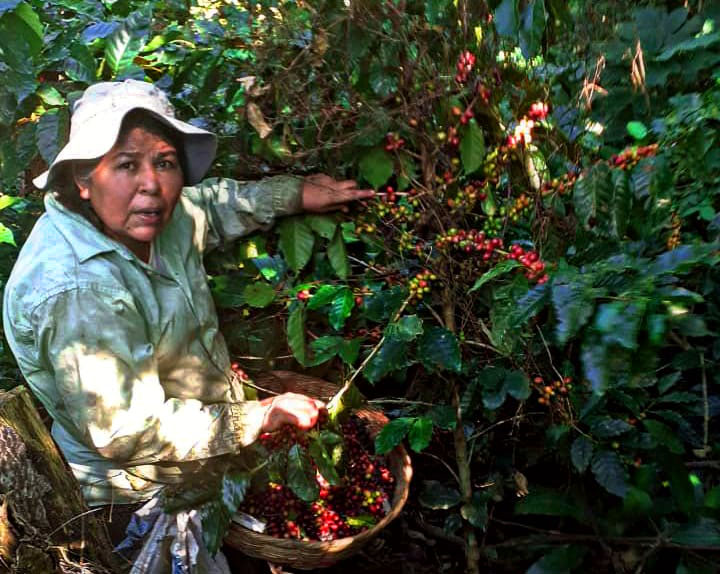- Salvadoran coffee growers increase the productivity of their plantations by applying the pruning techniques taught in the MOCCA training program.
Rosa Judith Rodríguez, a 54 year old woman and a mother of three children, has been dedicated to coffee growing since she was very young. She owns a small farm in the municipality of San Juan Opico, department of La Libertad (El Salvador).
In 2021 she joined the MOCCA training program with the interest of learning better coffee growing practices that would allow her to increase the yields and quality of her harvest.
“I had diseased plants in my farm; the leaves had dark spots in the shape of moles. A year ago the MOCCA technician approached me and we began to receive training to learn pest and disease control. I quickly became familiar with the training and we began to see positive results,” Rosa says.
In addition to the results obtained from proper pest and disease control, Rosa began to apply the pruning techniques learned in the tissue management training module.
Tissue management through pruning consists in eliminating the unproductive or diseased parts of the coffee plant and stimulating the growth of new healthy and productive tissues. The MOCCA training program helps coffee growers to select the appropriate type of pruning according to the needs of their plantation.
“This year my coffee farm yields went up 20%! Correct pruning helps me have more productive coffee plants. In addition, I have managed to reduce the incidence of pests and diseases in my plantation. I used the profits to make investments in my farm and pay some debts”.
Rosa Rodríguez, coffee producer | La Libertad, El Salvador

Rosa is one of the 1300 coffee growers in El Salvador who have been trained by the MOCCA program and its partnership with the Banco de Fomento Agropecuario (BFA), with 40% women participation.
“In the past most women stayed at home and very few had their own farms. Fortunately, today that is changing and more and more women have better opportunities to choose what is best for them,” says Rosa.
For his part, Guillermo Quintanilla, another coffee producer from San Juan Opico, mentions that pruning and other weed management practices, allowed him to have healthier plants and a significant increase in productivity.
In El Salvador, MOCCA works in support of the “Plan de Transformación y Despegue Sostenible del Café”, within the framework of the Master Plan for the Rescue of Agriculture of the Ministry of Agriculture whose goal is to renew 50,000 “manzanas” of coffee.







